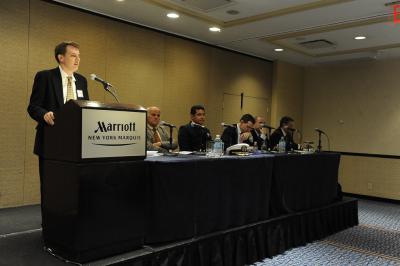
Charlie Savage, a national security reporter for The New York Times has appeared at the past three NAFUSA conferences as the moderator or panel member on important topical issues. At NAFUSA’s New York conference in 2010, Savage, shown above at the podium, moderated the two hour panel discussion on “The Appropriate Forum to Prosecute Terrorism Cases.” Panel members included NAFUSA members Ken Wainstein and David Iglesias, together with U.S. District Judge John Coughenour, Eugene Fidell of Yale Law School and Matthew Waxman of Columbia Law School.
Savage continues his reporting on this important topic and on Sunday, January 27, He penned his first Sunday Review piece in The Times: Who Decides the Laws of War?
Savage writes of the dispute between Brig. Gen. Mark S. Martins, chief prosecutor of the military commissions system and the Obama administration. Martins is the lead prosecutor in the procedings against Khalid Shaikh Mohammed and four others charged with aiding the 9/11 terrorist attacks.
The issue, as Savage describes:
is it valid for the United States to use tribunals to charge idiosyncratic American offenses like “conspiracy,” even though they are not recognized as war crimes under international law?
The current dispute traces back to an appeals court ruling in October that vacated a tribunal’s verdict in 2008 against an Al Qaeda driver because his offense, “material support for terrorism,” was not a recognized international war crime at the time of his actions. The judges rejected the Justice Department’s argument that the charge was nevertheless valid under an American “common law of war” and because Congress had listed the crime as an offense for the tribunals in a 2006 statute.
General Martins pushed to abandon the conviction in another case which relied upon the charge of “conspiracy”, which is not recognized as an international war crime. He has, however, been overruled by Attorney General Eric Holder. General Martins refused to sign the Justice Department brief, but has been overruled by the Pentagon.
The issue is complicated by the action of Congress forbidding the prosecution of Guantanamo detainees in federal court, where they could be prosceuted for offenses such as conspiracy.
Savage quotes another of the NAFUSA New York panel members, Eugene Fidell:
“It’s tempting to view this as about General Martins, but it’s not,” he said. “Decisions about prosecuting detainees have become about what is feasible as opposed to what is rational. The constraints imposed by Congress are forcing officials into contorted positions which are particularly uncomfortable for military lawyers, who don’t want to get near the ‘third rail’ of destroying reciprocity.”

You must be logged in to post a comment.